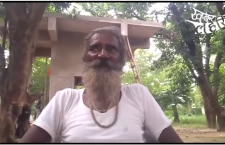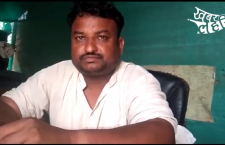Reviving the Epic Shit series, in the wake of the recent spate of infant deaths in Gorakhpur, which has brought rural health back on the media map. (And nowhere else.)
Part IV of Epic Shit, aligning with Episode 6 of The Kavita Show.
Kavita is in a sombre mood. We’re prepping to shoot The Kavita Show, a news and views YouTube show that, just 5 episodes in, has got her fame and acclaim, and the production of which, is still aglow with novelty. Kavita’s garnered local fans in her hometown Banda, who’ve coined the epithet ‘Bundelkhand ki sherni’, a tribute to her inimitable personality.
But Kavita is not altogether here. She is thinking about those 70 lives, those infants and toddlers, who were left to die in BRD Medical College in Gorakhpur around 2 weeks ago – but there is a feeling we have, that she’s left us to travel to another place and time.
We quickly find out why.
Shreya, you see, would have been five today.
In June 2012, Kavita was at a Khabar Lahariya training workshop in Chitrakoot when one of the trainees, Shraddha, screamed. It was an after-hours session and Shraddha, who had brought her infant daughter along to the workshop, was in a panic because her baby had started breathing very strangely.
A few hours later, with daybreak, Shraddha’s baby was no more.
Her name was Shreya and she was three months old.
Kavita back-tracks the horrific journey – one she made from the workshop venue through the town, from one doctor to another, in a desperate attempt to save Shreya’s life. “Shraddha was frozen, shocked,” recalls Kavita, “and so we just took the baby from her arms and rushed out for help.” They hijacked an auto – “Maine kaha kaise nahi jayega, chal ab tu” – and set off to the government hospital. Tiny as she was, Shreya, you could see her little chest in pain – she was definitely having difficulty breathing – this, they could tell. At the hospital, Kavita and her colleagues ran straight to the Emergency Ward, but there was no doctor on call. “There was this one compounder who barely looked at us, and told us to leave.” When they ranted and raved and pressed on, the compounder relented and hooked Shreya onto oxygen for a while, but it didn’t seem to ease her suffering.
They all proceeded to the doctor’s residence next, but were not entertained there. “Darwaza bhi nahi khola unhone,” says Kavita.
Kavita’s voice and body is wavering now. One step further, and there will be a collective breakdown. So, she chooses to tell us about the number of doctors’ homes she visited that night –”eight”. How Shreya felt, nestled close to Kavita, as she went travelling across the length and breadth of Karwi town – “stone-cold”. Doctor after doctor refused to treat Shreya, to do something about the situation – “haath bhi nahi lagana chahte the”.
Shreya breathed her last in Kavita’s lap. And she found herself trapped in the ruthless prison of guilt in that moment: “Kya javaab doongi main Shraddha ko?” It is a cage that holds Kavita hostage this Delhi morning – it’s a muggy one, the kind that brings with it buried feelings of pain and guilt, oppression and suffering.
It’s the kind of story you never ever get closure on.
The kind Kavita encounters only too often.
Lives nipped in the bud when pregnant women, full-term, are denied medical attention. Like Phulkumari in Banda’s Oran village, who was refused aid at the Banda district hospital – after having suffered an excruciating three-hour bus ride, because the ambulance they’re entitled to by law had not arrived. At the hospital, the family allege that they were asked to cough up INR 10,000. Rajkarnan, Phulkumari’s husband, promised them the sum, an exorbitant amount for him, and even arranged for half of it. According to him, his wife was denied treatment until he could procure the full amount. Meanwhile, the baby’s head had already started to come out – soon after which, both Phulkumari and the baby died.
Rajkarnan’s eyes, as he spoke to us that day and again when we followed up on the case to find out about compensation – there hadn’t been any – mirror the abyss we see in Kavita’s.
The apathy is a palpable one – another sarkari yojna that is broken, dysfunctional and downright dangerous. The National Rural Health Mission, our public health policy, sets out an elaborate infrastructure for free health facilities at the village, block and district level. The Janani Suraksha policy, within the ambit of the NHRM, is specifically designed to provided focussed care for jachchas and their bachchas. And yet, Phulkumari is by no means an exception, a rupture in the narrative of maternal healthcare. She is a ghost that haunts the derelict PHCs and under-equipped CHCs and district hospitals Kavita roams.
Vandana is a young woman married into a farmers’ family, who lives in Nabipur village in Block Trivediganj, in the district of Barabanki. She decided to pay a visit to the local health centre for a diagnosis and treatment – she had been complaining of extreme discomfort and pain in her vagina. At the centre, she was told it was a minor procedure, but what followed was nothing short of a nightmare. The “surgery” was a disaster and her stitches came undone almost immediately after. “They tore through her flesh”, we’re informed by her family, and then, the refrain, “They had asked for 4,000 rupees, and we had managed to hand over 2,000… Their irritation had been very apparent.” The doctors advised Vandana and her family to “take her case to Lucknow”, where she would be given “proper treatment”. They also discharged her the night of the botched surgery, saying they couldn’t monitor recovery. For our report, we had to do quite a few rounds of Haidergarh’s government hospital before we finally got an appointment with the surgeon, one Doctor MK Gupta, according to whom the entire case was a figment of somebody’s imagination. A bad writer, clearly. “We have never even seen this patient you speak of,” he said gruffly, and jabbed at the register as proof, “You can see yourself, there is no record of this.” His insolence as well as his rage was frightening: a sick blend of absolute power and zero accountability.
Do ghosts haunt Dr Gupta too, we wonder?
Meanwhile, Vandana’s family is considering the “big city private hospital treatment” option, because Vandana cannot even sit properly anymore. But, just like Phulkumari, we know that what happened to Vandana was not an anomaly. India has the most shameful statistics on rural health benefits on the ground, especially the health of rural women. Rural maternal health continues to be in shambles – an Indiaspend study of government data and research findings highlighted a shocking gap in care models for pregnant women and new mothers and WHO guidelines in reducing risk and complications.
According to the World Health Organization report of 2016, 35.7% of children in the age group of 0-5 years in India are malnourished. Of that, Uttar Pradesh occupies top spot – at 46.3% of malnourished children in that age group. A micro-vision of this, we reported on up-close, in Mahoba’s Ajnar village recently, where the number of shrivelled, howling creatures in mothers’ laps made for a horror-movie vision. This, despite the Poshan Punarvaas Kendra, or the Nutrition Rehabilitation Planning Centers conceptualized primarily and precisely to counter malnourishment in children. Despite several more policies in the pipeline, one of which has the CMO, Dr SK Vaashnay, supremely excited. “We will end malnourishment in the district in the next six months”, he claimed. Because “The Mega Call Center” – The Latest Yojna – is being planned even as we speak, he informs us.
And that’s not all. In this episode of The Kavita Show, you will hear about a harrowing experience featuring some super-quick attention by a quack – that peculiar breed of “jhola-chhap doctors”, borne of precisely this broken rural healthcare system – that will have the hairs on the back of your neck stand. Kavita shudders involuntarily each time she relates it.
When What-Happened-at-Gorakhpur splashes across headlines and trends on Twitter so, we wonder again and again how this continues to be the norm, how this continues to be alright. How the state health minister rattles off “These deaths happen every year in August,” as part of his official statement, and continues to stay on as state health minister.
These questions do not make us cynical. They do not lead us into hopelessness and despair. We are very mindful of that abyss, and we do not step in – we hover at the edge, at its mouth; we turn our cameras onto it, into it, deep inside.
We ask more questions.

